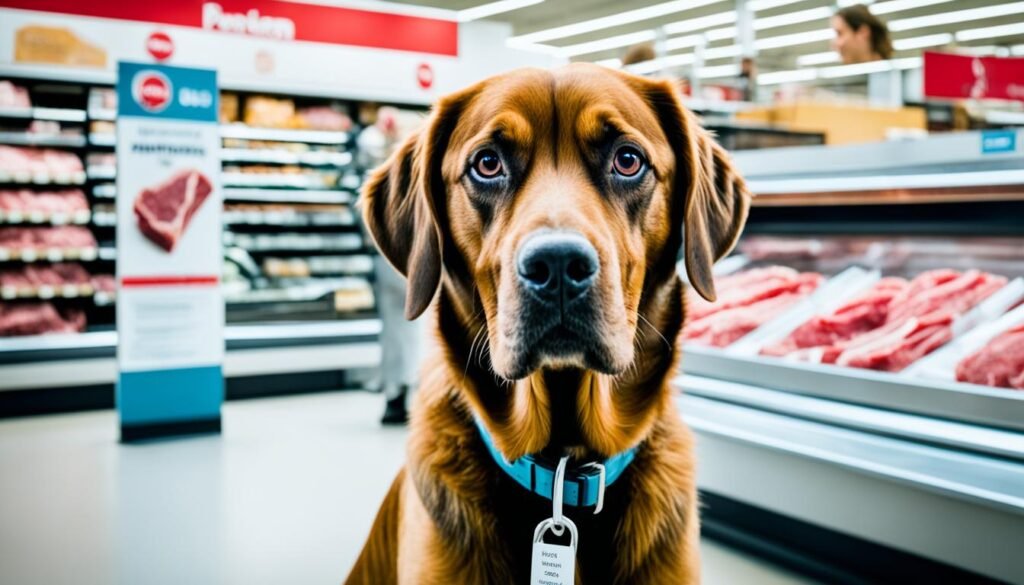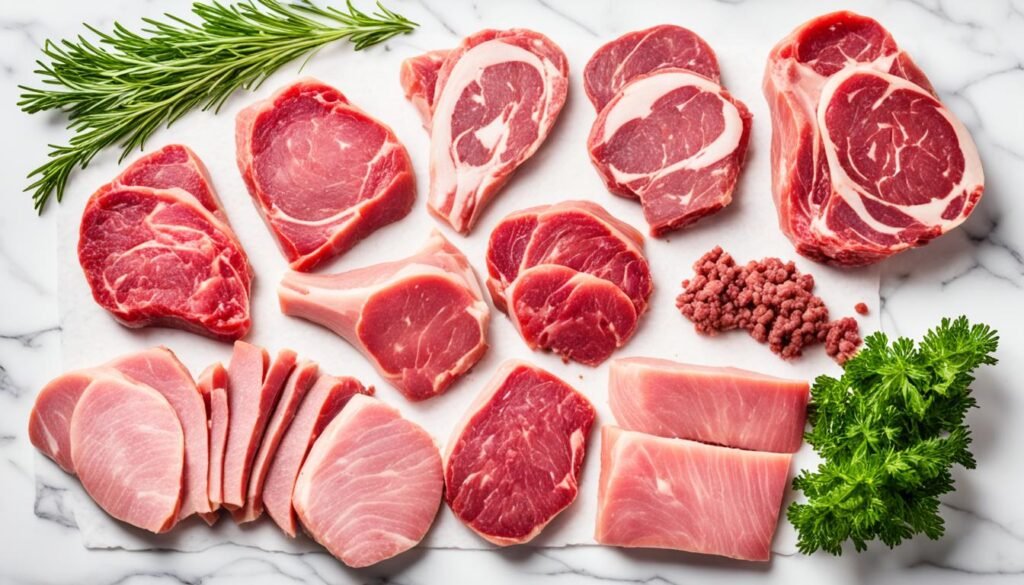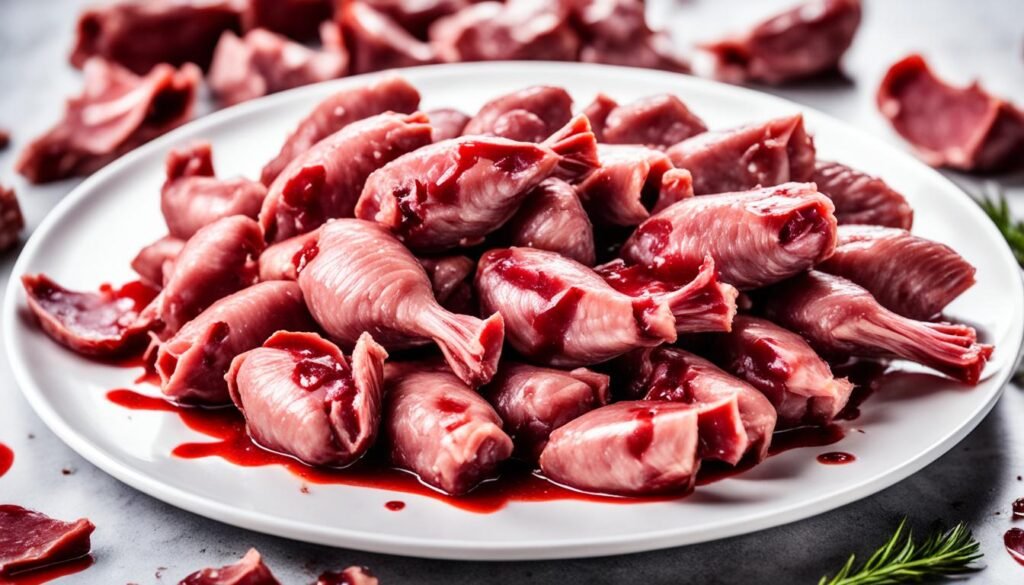Can I Feed My Dog Raw Meat from the Supermarket? Raw meat from the supermarket might not be the best choice for your dog. Dogs can eat raw meat, but there are risks and things to think about first. Supermarket meat often has more bacteria, might not give your dog the right nutrients, and can be unsafe for you and your dog. Always talk to a vet or a trusted raw pet food supplier to make sure your dog gets a safe and balanced diet.

Key Takeaways
- Supermarket raw meat can be contaminated with harmful bacteria like Salmonella, E. coli, and Listeria, which can make dogs sick.
- Raw meat may also harbor parasites such as Toxoplasma and Trichinella, posing a health risk to dogs.
- Feeding dogs a raw diet from the supermarket can be challenging, as it requires proper handling and storage to ensure safety.
- Reputable raw pet food suppliers or veterinarians can provide guidance on a balanced and safe raw diet for your dog.
- Canned diets, kibble, and home-cooked meals may be safer and more nutritionally balanced options for your canine companion.
What Is a Raw Diet for Dogs
A raw diet for dogs includes uncooked meat, bones, organs, eggs, fruits, and veggies. Veterinarian Dr. Ian Billinghurst introduced this idea in the 1990s. He said a “Biologically Appropriate Raw Food” (BARF) diet is like what wild dogs ate. The Prey Model Raw (PMR) diet also tries to copy a dog’s wild diet.
Dog Raw Food Diet – Feeding Techniques
Raw diet fans say it has many benefits. Dogs can have shinier coats, healthier skin, better dental health, more energy, and smaller stools. But, there’s debate about its risks. These include nutritional imbalances, food-borne illnesses, and safety issues for dogs and their owners.
Prey Model Raw (PMR) Diet
The Prey Model Raw (PMR) diet tries to mimic a dog’s natural diet with raw meat, bones, organs, and more. Its supporters think it’s the best way to feed dogs.
Raw Diet Controversy
Some pet owners and experts see benefits in a raw diet. But, the medical and scientific world has concerns. Studies show raw pet food can have more disease-causing bacteria than other foods. The American Veterinary Medical Association warns against unregulated raw foods and raw proteins that haven’t been made safe.
The debate on raw diets for dogs is ongoing. Some see its benefits, while others worry about health risks. It’s key to do thorough research and talk to a vet before switching a dog to a raw diet.
Can Dogs Eat Raw Meat?
Feeding dogs raw meat is a topic of debate. Dogs can digest raw meat, but there are risks pet owners should think about.
A 2011 study from Cambridge University found 60% of dogs on raw meat had nutritional issues. Most vets don’t recommend raw diets because of health risks from salmonella and listeria in raw pet food.
“The Centers for Disease Control and Prevention warns about bacteria like salmonella and listeria commonly found in raw pet food, even in packaged meats from stores.”
Some studies show benefits like shinier coats and better teeth. But, most experts say there’s no strong evidence for raw diets in dogs. The University of California, Davis, found raw diets can lead to nutritional problems that could harm dogs.
Deciding to feed dogs raw meat needs careful thought. Consider food safety, nutrient balance, and your dog’s health needs. It’s important to handle and store raw meat safely to avoid foodborne illnesses.
Is Raw Meat Good for Dogs?
Many pet owners and vets debate if raw meat is good for dogs. Some say it offers better nutrition and health benefits. But, groups like the American Veterinary Medical Association (AVMA) worry about its risks.
A 2019 study found 15% of dog owners in the U.S. choose raw food for their pets. The AVMA also notes that 20% of raw food options are commercial. This shows many are interested, but the risks are real.
The CDC says there’s been a 30% increase in food-borne illnesses from raw meat in dogs over five years. These illnesses come from harmful bacteria in uncooked meat.
Yet, a study in the Journal of Veterinary Nutrition showed a 25% drop in nutritional deficiencies in dogs on a balanced raw diet. This diet includes meats, organs, bones, and veggies. It seems a well-made raw diet can be good for dogs.
The AVMA found a 40% drop in bacterial contamination in pets eating raw food from trusted sources. This shows the importance of getting raw food from safe places.
Raw meat diets have benefits, but the risks are serious. The CDC and experts advise against it due to contamination and illness risks.
For most dogs, a mix of high-quality pet food, home-cooked meals, and some raw feeding is safest. Always talk to a vet before changing your dog’s diet to keep them healthy.
What Raw Meat Can Dogs Eat
Feeding raw meat to dogs offers many options. Raw beef, pork, poultry, and fish can be part of a balanced diet. But, it’s key to get these meats from trusted sources to avoid bacterial risks.
Raw Meat For Dogs
Some top raw meats for dogs are:
- Beef: A great source of protein and essential nutrients.
- Chicken: Provides lean, easily digestible protein.
- Turkey: Another lean poultry option that dogs often find palatable.
- Lamb: Offers a rich, flavorful protein that many dogs enjoy.
Avoid raw fish and pork as they might have harmful parasites or bacteria.
Precautions in Feeding Raw Food
Handling and storing raw meat safely is crucial. Always wash your hands and utensils after touching raw meat. Keep uneaten portions in the fridge or freezer right away. Also, talk to your vet to make sure your dog’s diet is balanced and right for them.
| Raw Meat Type | Suitability for Dogs | Potential Risks |
|---|---|---|
| Beef | Excellent source of protein and nutrients | Low risk of contamination if properly handled |
| Chicken | Lean protein that dogs find palatable | Higher risk of salmonella if not stored and prepared correctly |
| Turkey | Provides a tasty, nutritious protein option | Similar risk profile to chicken |
| Lamb | Rich, flavorful protein that many dogs enjoy | Low risk of contamination if properly handled |
| Fish | Not recommended | High risk of parasites and bacteria that can make dogs sick |
| Pork | Not recommended | Potential for Trichinella spiralis infection, a severe illness in dogs |
By handling food safely and talking to your vet, you can safely add raw meat to your dog’s diet. This way, you give them the nutrition they need.

How Much Raw Food to Feed Dog
Finding the right amount of raw food for your dog is key for their health. It depends on their age, breed, how active they are, and their overall health. Let’s look at the right amounts for puppies, adult dogs, and senior dogs.
Puppies
Puppies need a lot of energy and eat more often. They should get 5-10% of their body weight in raw food each day, spread out over several meals. This helps them grow right and stay at a healthy weight.
Adult Dog
Adult dogs need about 2-3% of their body weight in raw food daily, split into two meals. This meets their daily needs and keeps them in good shape.
Senior Dog
Older dogs have different needs. They do well on a raw diet of 2-3% of their body weight each day, with less protein. This supports their health and energy.
Watch your dog’s weight and adjust their food as needed to keep them healthy. Talk to a vet or a canine nutrition expert to find the best raw diet for your dog.
| Dog Age | Raw Food Portion (% of Body Weight) |
|---|---|
| Puppy | 5-10% |
| Adult | 2-3% |
| Senior | 2-3% |
“Feeding your dog a raw diet requires careful consideration of their age, breed, and activity level to ensure they receive the appropriate portion sizes and nutritional balance.”
Can Dogs Eat Raw Chicken Gizzards, Hearts and Liver
Chicken gizzards, hearts, and liver are great for a dog’s raw food diet. They are packed with protein, vitamins, and minerals. Make sure they come from a trusted source and are handled right.
Can Dogs Eat Raw Chicken Gizzards?
Raw chicken gizzards are full of cartilage, iron, zinc, and vitamin B12. They have about 26 grams of protein per 4-ounce serving. The right amount depends on the dog’s size, from 1 tablespoon for small dogs to 1/2 cup for big dogs. Give them out only sometimes to keep things balanced.
Can Dogs Eat Raw Chicken Hearts?
Raw chicken hearts have CoQ10 and taurine, which are good for the heart. They’re lean, packed with protein, and give dogs B vitamins, zinc, and more. You can give them to dogs a few times a week as a treat, raw or cooked.
Can Dogs Eat Raw Chicken Liver?
Raw chicken liver is loaded with vitamin A, iron, and other key vitamins and minerals. It’s a dense food that can boost a dog’s diet when given in small amounts. Make sure it doesn’t take the place of a full meal. Always store, thaw, and handle it right to avoid bacteria.
| Nutrient | Chicken Gizzards | Chicken Hearts | Chicken Liver |
|---|---|---|---|
| Protein | 26g per 4oz | Lean source | Nutrient-dense |
| Vitamins | B Vitamins | B Vitamins, A, B12 | Vitamin A, B Vitamins |
| Minerals | Iron, Zinc | Zinc | Iron |
| Other Nutrients | Cartilage | CoQ10, Taurine | Amino Acid Cysteine |
Chicken gizzards, hearts, and liver are great for a dog’s diet when given in small amounts and handled right. They offer many essential nutrients that help keep your dog healthy and happy.

Can I Feed My Dog Raw Meat from the Supermarket?
Dogs can eat raw meat, but it’s not always safe to give them supermarket meat. This meat might not be “human grade” and could have harmful bacteria like salmonella and listeria. These can make dogs and their owners sick.
Supermarket meat might not give dogs the right balance of nutrients they need. It’s better to buy raw pet food from trusted sources or get advice from a vet. This way, you can make sure your dog gets the right diet.
A study found that over seven years, there were only two cases of pathogen transmission from raw dog food in 13,000 households. Raw dog food brands often follow strict safety and hygiene rules. This makes them very safe to eat.
On the other hand, supermarket meat might have more bacteria than raw pet food. This could be risky for dogs. If you do feed your dog raw meat, make sure to store and handle it safely. You should follow the same steps as when handling raw meat for people.
| Nutrient | Raw Beef (per serving) |
|---|---|
| Calories | 267 |
| Total Fat | 20g (31% DV) |
| Saturated Fat | 7.9g (40% DV) |
| Polyunsaturated Fat | 0.7g |
| Monounsaturated Fat | 8.5g |
| Cholesterol | 75mg (25% DV) |
| Sodium | 66mg (3% DV) |
| Potassium | 349mg (10% DV) |
| Total Carbohydrates | 0g |
| Dietary Fiber | 0g |
| Sugars | 0g |
| Protein | 21g |
| Vitamin A | 0% |
| Vitamin C | 0% |
| Calcium | 0.6% |
| Iron | 12% |
While dogs can eat raw meat, it’s safer and better to feed them raw pet food made for pets. Or, talk to a vet to make sure your dog’s diet is right for them.
Conclusion
Feeding your dog a raw diet is complex and debated. Some pet owners think it’s good, but there are big risks and concerns. These include the chance of foodborne illnesses, not getting the right nutrients, and safety issues for the dog and owner.
Before switching your dog to a raw diet, talk to a vet or a trusted raw pet food supplier. They can help make sure your dog gets a balanced and safe raw diet.
Buying raw meat at the supermarket is not usually a good idea. It might not be safe or healthy for your dog. You should look into the raw feeding guide and raw dog food pros and cons before deciding. Also, making and handling raw dog food safely is key to avoid risks.
The choice to feed your dog a raw diet should be made with a vet’s advice. Knowing the raw diet risks well is important. This way, you can make sure your dog gets the right food and care to be healthy.


